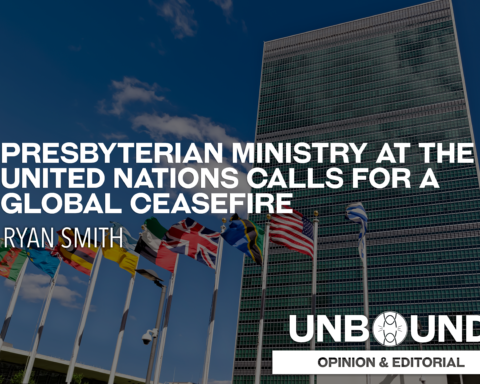The Ecumenical Witness of the PC(USA) in the UN Community

The Presbyterian Church (U.S.A.) affirms that Presbyterians do ministry in partnership. At the United Nations, this involves the Presbyterian Ministry at the United Nations working with ecumenical partners to address issues based on the policies established by the PC(USA)’s General Assembly. Our efforts in the area of gender justice provide a clear example of such work.
Each year the United Nations Commission on the Status of Women, a functional commission of the UN Economic and Social Council, meets to promote gender equality and the empowerment of women worldwide. Each Commission addresses a specific theme established by the Economic and Social Council that may involve looking at progress and gaps in the implementation of the 1995 Beijing Declaration and Platform for Action – the key global policy document on gender equality – or at emerging issues that affect gender equality and the empowerment of women. Each Commission produces an outcome document, called “agreed conclusions” that contains a set of recommendations intended to enhance gender justice. This document of recommendations is given to governments, intergovernmental organizations, and civil society.
___________________________________________
The Presbyterian Ministry at the United Nations works ecumenically every day.
___________________________________________
The Presbyterian Church (U.S.A.) is one of over 4,000 nongovernmental organizations, accredited by the United Nations, that have the opportunity to provide written and/or oral statements to the Commission. The PC(USA) makes statements on its own behalf. Through participation in a group called Ecumenical Women, the church also makes statements and engages the Commission ecumenically.

Photo by Christine Mangale
Ecumenical Women is an international coalition of church denominations and ecumenical organizations that have status with the United Nations Economic and Social Council. As described on the Ecumenical Women Web site, “These bodies share and are committed to a common mission and vision. Grounded in our faith and commitment to global justice, Ecumenical Women trains and empowers our expanding network to advocate for gender equality at the United Nations.”
The Rev. Jennifer Butler, then Director of the Presbyterian Ministry at the United Nations, was part of the ecumenical community that created Ecumenical Women. Presbyterians, both through our UN Office and through Presbyterian Women in the PC(USA), have played and continue to play leadership roles in Ecumenical Women.
___________________________________________
God’s passion for diversity shines through the community of nations. No two nations are identical. A similar reality marks the Church.
___________________________________________
The member organizations of Ecumenical Women look each year at the theme under consideration by the Commission on the Status of Women. They then consult with their members and organizational policies to identify issues or areas of concern related to the theme of that year’s Commission. These are checked against Ecumenical Women’s memorandum of understanding for the organization’s shared work. A writing team compiles the information into a shared document. Member organizations can respond and provide input. When a final draft is written, member organizations can choose to sign on or not. The statement is then submitted to the Commission, according to the rules and process established by the Commission.

Photo by Andrew Osborne
The statement is then distilled into talking points. These guide the Ecumenical Women community as it advocates with member states in relation to the agreed conclusions, the outcome document of the Commission.
Ecumenical Women holds an orientation for individuals attending the Commission from the various member groups. This helps participants understand the Commission experience. Daily worship grounds Ecumenical Women’s work in the Gospel of Jesus. Meals and debriefing gatherings during the two-week long meeting of the Commission strengthen the witness of Ecumenical Women and nurture ecumenical friendships and relationships.
___________________________________________
Presbyterians, both through our UN Office and through Presbyterian Women in the PC(USA), have played and continue to play leadership roles in Ecumenical Women.
___________________________________________
In recent years, Ecumenical Women has experienced a number of successes in helping to shape the agreed conclusion documents. Through the advocacy efforts of Ecumenical Women, working with member states to identify and propose language, agreed conclusions have affirmed the need for women’s and adolescent girls’ access to , including sexual and reproductive health-care services (2014); the need for transportation access for women living in rural areas (2012); and the need to address bullying against girls in school to help provide a positive educational experience (2011). The world’s countries will be asked to report on how they are working on these issues.

Photo by Mark Koenig
Participation in, and leadership of, Ecumenical Women is but one example of how the Presbyterian Ministry at the United Nations works ecumenically.
The Presbyterian Ministry at the United Nations works with the World Council of Churches and the ACT Alliance in New York. We draw on their resources and use their staff people as speakers.
The Presbyterian Ministry at the United Nations also represents the World Communion of Reformed Churches (WCRC) within the United Nations community. We consult with other members of the Communion as we advocate within the UN system. WCRC staff members have participated as part of the Presbyterian delegation to the UN Commission on the Status of Women. Ryan Smith from the ministry serves on the WCRC’s working group on human trafficking.
___________________________________________
A crucial task of advocacy is helping to amplify the voices of people whom the world ignores, silences, or pushes to the margins.
___________________________________________
A crucial task of advocacy is helping to amplify the voices of people whom the world ignores, silences, or pushes to the margins. For the Presbyterian Ministry at the United Nations, this means we consult with ecumenical partners in other countries who will be affected before we engage in advocacy. It also means finding creative ways to bring our ecumenical partners’ voices into international conversations and deliberations.

Photo by Mark Koenig
An example:
As do many of the world’s people, Presbyterians watch in anguish as violence tears at Syria. We grieve for the people who are killed or wounded and the destruction and devastation being done to the country – its culture and shared life.
The Presbyterian Church (U.S.A.) has a long-standing relationship with Christians in Syria and Lebanon. Our primary partner is the National Evangelical Synod of Syria and Lebanon (NESSL). Presbyterians have supported our sisters and brothers in NESSL through prayer, solidarity visits, financial gifts, letters to the U.S. President and Secretary of State, advocacy with the United Nations Security Council, and an advocacy campaign when the United States threatened a military strike in 2013.
___________________________________________
On several occasions during the crisis in Syria, the Presbyterian Ministry at the United Nations has arranged meetings between our partners and representatives of UN member states serving on the Security Council.
___________________________________________
On several occasions during the crisis, leaders from NESSL have visited New York. The Presbyterian Ministry at the United Nations has arranged meetings between our ecumenical partners and representatives of UN member states serving on the Security Council. Meetings have also been arranged with the UN’s Inter-Agency Task Force for the Syrian Crisis, a group that includes representatives of the various UN agencies working in Syria.

Photo by Mark Koenig
These meetings provided opportunities for our ecumenical partners to share their stories and advocate for the needs of Syria and Lebanon. Their visits did not change the situation in Syria or provide inspiration for a creative UN initiative. The Security Council did strengthen the call for protection of religious minorities, a concern raised by our NESSL partners and repeated by the Presbyterian Ministry at the United Nations, in the one resolution on Syria it has adopted. But Syria’s agony continues and deepens. As the UN continues to deliberate and debate on responses, those who met our partners will always see and hear them as they consider how to seek a just and lasting peace in Syria.
The ministry has also arranged opportunities for our NESSL partners to speak to Presbyterians: to educate and equip us for prayer and action with our partners. This involves making presentations to adult Sunday school classes as well as at events open to the general public.
___________________________________________
Those who have met our partners have not forgotten what they heard.
___________________________________________
Similar opportunities have been arranged for ecumenical partners from South Sudan, Colombia, Cuba, Madagascar, Guatemala, Malawi, and Zambia. Again, those who have met our partners have not forgotten what they heard. Presbyterians continue to pray with our sisters and brothers.

Photo by Ricky Velez-Negron
The Presbyterian Ministry at the United Nations works ecumenically every day. As we engage in advocacy within the UN system on issues ranging from seeking peace to protecting international religious freedom to ending hunger, we work with UN programs and secular groups. We also partner with faith-based organizations including Caritas Internationalis from the Roman Catholic tradition and the Lutheran World Federation as well as with denominations such as the United Methodists, the Quakers, and the Mennonites, to name just a few.
Together we can do things we cannot do alone. We can be more effective and increase our impact. We enhance our witness to Christ.
Ecumenism comes from the Greek word, oikoumené, which means the inhabited earth or the inhabited world. Practically, it seems only fitting to work ecumenically within the community of nations that is the UN—a community that represents the inhabited world.
___________________________________________
Together we can do things we cannot do alone.
___________________________________________
God’s passion for diversity shines through the community of nations. No two nations are identical.

Photo by Mark Koenig
A similar reality marks the Church. The Church is diverse. But, as Paul wrote to the Corinthians, the Church is also one: “Indeed, the body does not consist of one member but of many.” (I Corinthians 12:14)
One body. Many members. But we share the same Holy Spirit, break the same bread, drink from the same cup, and follow the same Christ. A rich diversity of communions exists around the world, bound together by invisible cords of love that can never be broken.
Those cords become visible within the UN community when the followers of Jesus work ecumenically in common ministry. The Presbyterian Church (U.S.A.), represented by the Presbyterian Ministry at the United Nations, is blessed to be part of that witness.
______________________________________________________________
AUTHOR BIOS: Rev. Mark Koenig is the Director of the Presbyterian Ministry at the United Nations. He has served in the Presbyterian Church (U.S.A)’s antiracism initiative and the Presbyterian Peacemaking Program. Ryan Smith is the Presbyterian Representative to the United Nations. Together, they work to inspire and equip Presbyterians to live as disciples in the global neighborhood and to help Presbyterians engage in advocacy, based on General Assembly policy, in the United Nations community.
Learn about ecumenical advocacy in our nation’s capitol at the Office of Public Witness!





Unbound Social